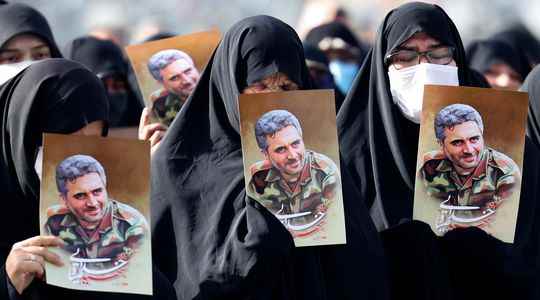Sunday, May 22, Hassan Sayyad Khodaï returned home by car, in the east of Tehran. In the middle of the afternoon, this colonel of the Revolutionary Guards, the armed force of the Iranian Supreme Guide, was passing near Parliament when two men on motorbikes stopped at his level. They killed him with five bullets in the body, before leaving at full speed. Once again, a cadre of the Iranian regime is eliminated in broad daylight.
In an Iran shaken by this targeted assassination, all eyes immediately turned to Israel. “I have no doubt that the blood of this martyr will be avenged,” promised the ultra-conservative president, Ebrahim Raïsi, before pointing the finger at the “global arrogance” responsible for this murder. In the vocabulary of the Iranian regime, this term designates the United States and the Jewish state.
“Israel is most certainly involved in this operation. There are precedents for the Mossad in Iran, whether it be the assassinations of scientists or the theft of confidential nuclear documents, asks Hugh Lovatt, Middle East specialist at the European Council on Foreign Relations There is no formal declaration of war between the two countries, nor any traditional balance of power, but Israel and Iran have been waging a shadow war for some time now.”
Iran has woven its web around Israel
Representatives of the Islamic Republic have never hidden their hatred of the very existence of the Jewish state. Opposite, Israel has been built on a security model, surrounded by hostile neighbors since its creation in 1948. “Iran keeps repeating that it is going to exterminate us. We Israelis have become accustomed to taking this kind of threats seriously,” an Israeli diplomat recently told us.
Since 2003 and the overthrow of Saddam Hussein in Iraq, Iran has developed its influence throughout the Middle East: its Shiite militias are in Iraq, Syria, Lebanon or Yemen. Thousands of Hezbollah missiles in Lebanon can reach Tel Aviv in minutes. In early March, the Israeli army reportedly shot down several Iranian combat drones heading towards Jerusalem. Everywhere, Israel remains the target to be shot down.
“We are, in reality, in a multidimensional war, estimates Yonatan Freeman, professor of international relations at the Hebrew University of Jerusalem. It is played out on the grounds of cyber, clandestine operations, affiliated military groups, but also of the diplomacy. In recent months, Israel has been putting its weight behind the talks between the West and Iran on the nuclear deal, and doing everything to influence the outcome.”
To curb the military ambitions of the Islamic Republic, Israel does not stop at diplomacy. While it does not recognize any operations in Iran, the Mossad, its intelligence service, has earned a reputation for its high-risk missions carried out in hostile territories, whether targeted assassinations of Iranian regime officials or destruction of military and nuclear facilities.
Despite everything, the Iranian nuclear program is advancing
For the past year, the new Israeli Prime Minister, Naftali Bennet, has gone a notch above. In February, he explained in an interview tired of “playing the game of Iran and looking like pigeons”, adding that it was time to increase operations on Iranian territory. Three weeks later, in March, a factory housing hundreds of combat drones went up in smoke near Tehran…
“Israel’s objective, if it is Israel that is carrying out these operations, is twofold, suggests Yonatan Freeman. First, to weaken the Iranian nuclear program and the regime’s terrorist activities. For example, the colonel killed in Tehran Sunday appeared to be planning attacks on Israeli diplomats. Second, Israel is sending a message: even in the event of a nuclear deal, we will continue to defend our own interests, and if necessary through unilateral action on Iranian soil.”
Despite several successful operations in Iran in recent years, including the assassinations of four senior scientists, Iran’s nuclear program continues to advance. According to experts, Tehran has never been so close to obtaining atomic weapons, and Washington is beginning to seriously worry. Upon arriving at the White House in January 2021, Joe Biden’s number one goal on the international stage was to bring Iran back into an agreement to frame its nuclear program. After a year of discussions, the negotiations are at a standstill, and an agreement is no longer on the agenda.
A military campaign or getting a better deal
On the front line, Israel opposes an international agreement that would not take into account Iran’s ballistic capabilities and its terrorist activities. The Jewish state is evaluating its options, in the event of failure of the agreement and escalation with Tehran. “The first alternative is a military campaign, but today nobody wants it. The Israelis are preparing for it but they don’t have the capabilities yet, and it remains to be seen whether they could embark on such a conflict. without the agreement of the Americans, assesses Hugh Lovatt. The second alternative is to obtain a better international agreement by resuming the maximum pressure campaign launched by Donald Trump against Iran. But this strategy has already failed and has had the main effect of ‘accelerate Iran’s nuclear program.’
At the end of May, the Israeli army will launch its largest military exercise for thirty years, involving thousands of soldiers and the American air force. For the first time, the two armies communicated the scenario of their joint exercise: a regional war against Iran.
